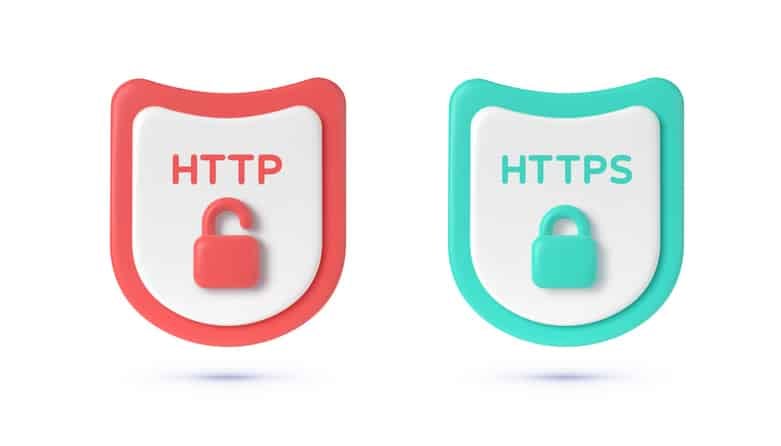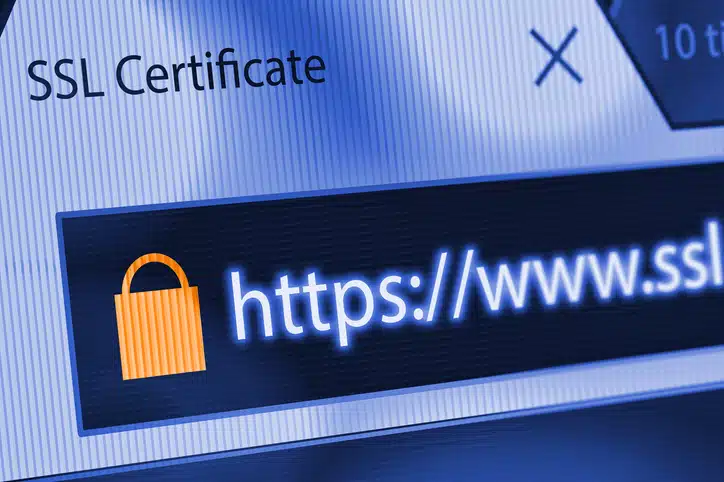In today’s interconnected digital world, ensuring the security and privacy of your online customers has become crucial – not only for their sake; but also for your website’s ability to rank with SEO.
One technology that plays a pivotal role in safeguarding sensitive information is SSL (Secure Sockets Layer) certificates. In this post, we’ll delve into the intricacies of SSL certificates, exploring their significance, functionality, and how they can benefit your website’s security and SEO. Let’s jump into it!
Understanding SSL Certificates
What Are SSL Certificates?
SSL certificates are small data files that establish a secure and encrypted connection between a web server and a browser. They serve as digital passports, authenticating websites’ identities and enabling secure data transmission. When an SSL certificate is installed on a website, it activates the HTTPS protocol, indicating a secure encrypted connection – this is usually displayed in your address bar as a closed lock.
Having a secure connection means that the data you send and receive from a site is encrypted and protected – this is why Google and other search engines prefer secure sites because they protect customer information from being leaked.
When implementing SSL, we recommend using HSTS (HTTP Strict Transport Security) for better security and speed.

Websites that don’t use SSL will usually have a security warning from most modern browsers. SSL is usually indicated by a lock icon in your address bar.
Why SSL Certificates are Important
SSL Keeps Your Data Secure
SSL certificates ensure that the data transmitted between a user’s browser and the web server remains encrypted and confidential. This encryption helps protect sensitive information such as passwords, credit card details, and personal data from being intercepted by malicious actors.
SSL Certificates Build Trust
Websites with SSL certificates display visual indicators, such as a padlock icon or a green address bar, signifying a secure connection. These trust indicators instil confidence in visitors, assuring them that their information is safe and reducing the risk of potential security breaches.
Being Secure Helps Search Engine Optimisation (SEO)
Search engines prioritise secure websites in their rankings, favouring those with SSL certificates. By securing your website with an SSL certificate, you not only enhance your security but also improve your chances of ranking higher in search engine results pages (SERPs).
What Types of SSL Certificates are there?
Domain Validated (DV) Certificates
DV certificates are the most basic type of SSL certificate. They verify that the applicant controls the domain but do not perform extensive background checks. DV certificates suit personal blogs, informational websites, and small businesses.
Organisation Validated (OV) Certificates
OV certificates require a more rigorous validation process, including verifying the domain ownership and conducting business checks. They provide more assurance to visitors and are typically used by businesses and organisations.
Extended Validation (EV) Certificates
EV certificates offer the highest level of validation. They involve a comprehensive check of the organisation’s legal and operational existence. Websites with EV certificates display the organisation’s name in the address bar, strengthening their credibility and trustworthiness.

How do SSL Certificates actually Work?
When SSL certificates work, you may hardly even notice that they are there. But behind the scenes, a lot is going on to secure your data. The main steps involved are:
Handshake
When users attempt to establish a secure connection with your website, the browser initiates a handshake process with your web server. This process involves the exchange of encryption algorithms and establishing a secure channel.
Encryption
Once the handshake is complete, the web server and browser begin encrypting the data transmitted between them. SSL certificates use cryptographic algorithms to convert data into an unreadable format, ensuring confidentiality.
Decryption
Upon receiving the encrypted data, the recipient server utilises the private key associated with the SSL certificate to decrypt the information and convert it back to its original form.
If you are starting out or looking for a free SSL option, we suggest looking at CloudFlare – you can set up a free SSL certificate without too much hassle.
The Conclusion
Implementing an SSL certificate is crucial for maintaining your website’s security, trust, and credibility. By encrypting data transmissions and providing visual trust indicators, SSL certificates safeguard sensitive information and enhance the user experience. Whether you’re running a personal blog or managing an e-commerce platform, securing your website with an SSL certificate is vital in protecting your users and establishing a reliable online presence.


